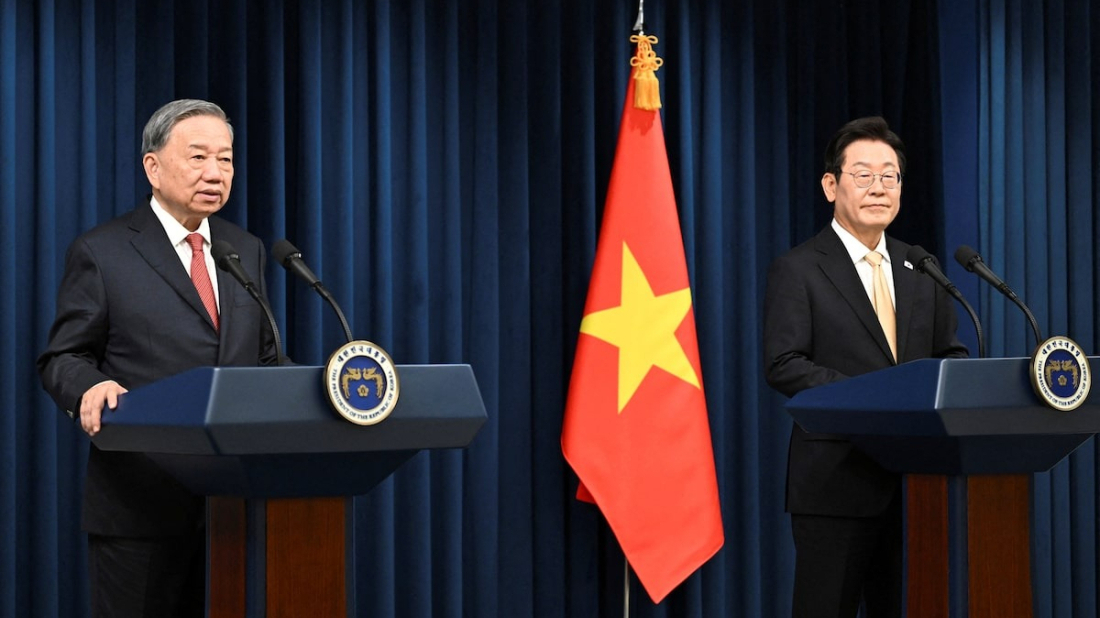EBRD supports Azerbaijani furniture maker
The European Bank for Reconstruction and Development (EBRD) has announced a lending the equivalent of $ 7 million to Saloğlu, Azerbaijan’s leading ...

South Korea and Vietnam have pledged to boost annual trade to $150 billion by 2030, signing 10 cooperation deals as new U.S. tariffs disrupt global supply chains.
South Korean President Lee Jae Myung hosted Vietnamese Communist Party general secretary To Lam in Seoul on Monday, marking his first state guest since taking office in June. The two leaders avoided public mention of U.S. President Donald Trump’s new levies — 15% on South Korean exports to the U.S. and 20% on Vietnamese goods — but emphasised the need to safeguard bilateral trade and investment.
Vietnam’s trade with South Korea was worth about $86.8 billion in 2024, official figures show. Lam said he welcomed further South Korean investment, noting that some 10,000 Korean companies are already operating in Vietnam. Lee said those firms “contribute to Vietnam’s economic development and mutually beneficial cooperation between the two countries.”
The governments signed 10 memoranda of understanding covering nuclear and renewable energy, finance, science and technology, and infrastructure such as high-speed rail. Lam, addressing Yonsei University in Seoul, urged South Korean firms to expand their presence in Vietnam and warned of the risks from fragmenting supply chains.
He called for joint development of semiconductors and new materials, and for South Korea to help train Vietnamese workers in sectors including artificial intelligence, biotechnology and shipbuilding.
Major South Korean companies, including Samsung Electronics, have long used Vietnam as a manufacturing and export hub, benefiting from lower labour costs, tax incentives and Hanoi’s network of free trade agreements. Potential areas for future investment include nuclear energy, LNG power plants and high-speed rail projects, Vietnamese officials said.
The world’s biggest dance music festival faces an unexpected setback as a fire destroys its main stage, prompting a last-minute response from organisers determined to keep the party alive in Boom, Belgium.
According to the German Research Centre for Geosciences (GFZ), a magnitude 5.7 earthquake struck the Oaxaca region of Mexico on Saturday.
A powerful eruption at Japan’s Shinmoedake volcano sent an ash plume more than 3,000 metres high on Sunday morning, prompting safety warnings from authorities.
China and the Association of Southeast Asian Nations will send an upgraded ‘version 3.0’ free-trade agreement to their heads of government for approval in October, Chinese Foreign Minister Wang Yi said on Saturday after regional talks in Kuala Lumpur.
A resumption of Iraq’s Kurdish oil exports is not expected in the near term, sources familiar with the matter said on Friday, despite an announcement by Iraq’s federal government a day earlier stating that shipments would resume immediately.
The European Bank for Reconstruction and Development (EBRD) has announced a lending the equivalent of $ 7 million to Saloğlu, Azerbaijan’s leading furniture producer and retailer, in local currency to help boost its competitiveness.
On Sunday, U.S. President Donald Trump urged China to greatly boost soybean imports from the U.S. to help reduce its trade deficit. However, experts say a sharp increase is unlikely due to ongoing trade tensions and China’s changing buying habits.
Nvidia’s (NVDA.O) H20 chips present security risks for China, according to a social media account linked to Chinese state media, which made the claim on Sunday after Beijing raised concerns about potential backdoor access in the chips.
De-dollarisation, the move away from the U.S. dollar in global trade and finance, is no longer a fringe idea. As geopolitical tensions rise and new financial tools emerge, could this shift really transform the global economy?
Kuwait says oil prices will likely stay below $72 per barrel as OPEC monitors global supply trends and U.S. policy signals. The remarks come during market uncertainty fueled by new U.S. tariffs on India and possible sanctions on Russia.
You can download the AnewZ application from Play Store and the App Store.

What is your opinion on this topic?
Leave the first comment